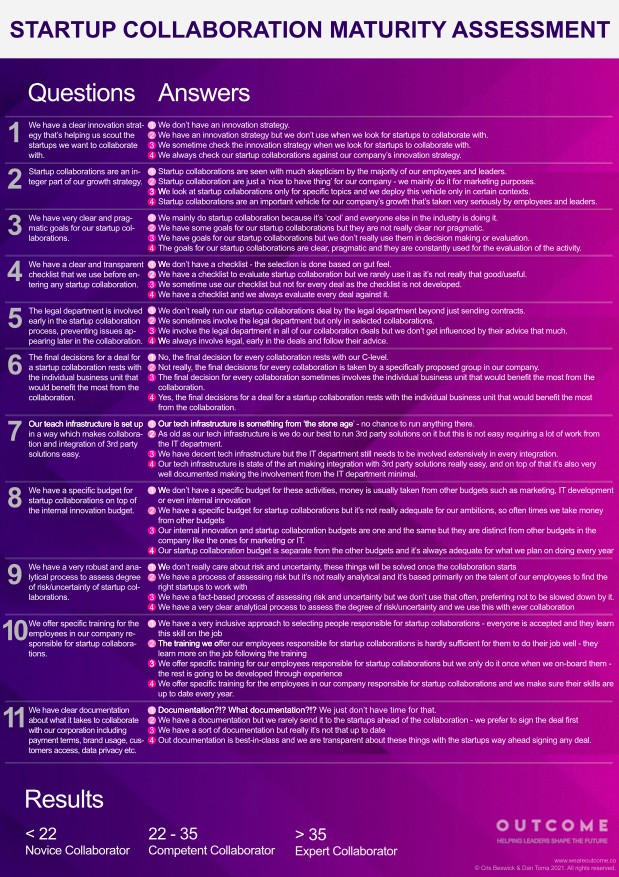
The Startup Collaboration Maturity Assessment
- Posted by Dan Toma
- On 17/05/2021
We are past the point of corporate-startup collaboration being seen as something novel, or outright crazy. Be it an accelerator program aimed at uncovering new customer trends. Or a call for pilots aimed at solving a certain corporate issue with the technology of startups. Or a corporate venture capital unit investing in the hottest startups in the ecosystem. Corporations collaborate with startups.
No matter where in the world you are reading this from, you probably know of a local example. But in spite of the proliferation of this symbiosis there are still many collaborations ‘going south’.
Being aware of the pitfalls of collaborations and building a checklist that can help guide the process are just two of the things corporations can do. Another thing enterprises can do is to understand their current startup collaboration maturity. This is an important first step for companies that want to get into collaborating with startups and it’s equally valuable for mature companies that have been in ‘this game’ for some time. These organizations can benefit by understanding which part of the ‘collaboration mechanics’ can be improved on.
The maturity a company seeking startup collaborations is not given only by the experience it has in ‘this game’ or size of the allocated budget. There are many things at play making a company a mature startup collaborator. Things like the process that’s being used. Or the integration of this innovation vehicle in the overall corporate growth strategy. Or even how skilled the responsible employees are to manage these collaborations.
To understand where your company is on startup collaboration maturity spectrum, and also pinpoint what’s holding you back, we encourage you to the take following assessment.
The Startup Collaboration Maturity Assessment
The startup collaboration maturity assessment is made up of 11 multiple-choice questions. Each question has 4 answer prompts. Select from these the ones that reflect your company’s reality the closest. At the end add up your score and see where your company lands on the spectrum. Also be aware of the questions where you scored the poorest – these are your company’s main collaboration maturity blockers.

- We have a clear innovation strategy that’s helping us scout the startups we want to collaborate with
- We don’t have an innovation strategy
- We have an innovation strategy but we don’t use when we look for startups to collaborate with
- We sometime check the innovation strategy when we look for startups to collaborate with
- We always check our startup collaborations against our company’s innovation strategy
- Startup collaborations are an integer part of our growth strategy
- Startup collaborations are seen with much skepticism by the majority of our employees and leaders.
- Startup collaboration are just a ‘nice to have thing’ for our company – we mainly do it for marketing purposes
- We look at startup collaborations only for specific topics and we deploy this vehicle only in certain contexts
- Startup collaborations are an important vehicle for our company’s growth that’s taken very seriously by our company’s employees and leaders.
- We have very clear and pragmatic goals for our startup collaborations
- We mainly do startup collaboration because it’s ‘cool’ and everyone else in the industry is doing it
- We have some goals for our startup collaborations but they are not really clear nor pragmatic
- We have goals for our startup collaborations but we don’t really use them in decision making or evaluation.
- The goals for our startup collaborations are clear, pragmatic and they are constantly used for the evaluation of the activity.
- We have a clear and transparent checklist that we use before entering any startup collaboration
- We don’t have a checklist – the selection is done based on gut feel
- We have a checklist to evaluate startup collaboration but we rarely use it as it’s not really that good/useful
- We sometime use our checklist but not for every deal as the checklist is not developed
- We have a checklist and we always evaluate every deal against it
- The legal department is involved early in the startup collaboration process, preventing issues appearing later during the collaboration
- We don’t really run our startup collaborations deal by the legal department beyond just sending contracts
- We sometimes involve the legal department but only in selected collaborations
- We involve the legal department in all of our collaboration deals but we don’t get influenced by their advice that much
- We always involve legal, early in the deals and follow their advice
- The final decisions for a deal for a startup collaboration rests with the individual business unit that would benefit the most from the collaboration
- No, the final decision for every collaboration rests with our C-level
- Not really, the final decisions for every collaboration is taken by a specifically proposed group in our company.
- The final decision for every collaboration sometimes involves the individual business unit that would benefit the most from the collaboration.
- Yes, the final decisions for a deal for a startup collaboration rests with the individual business unit that would benefit the most from the collaboration.
- Our teach infrastructure is set up in a way which makes collaboration and integration of 3rd party solutions easy
- Our tech infrastructure is something from ‘the stone age’ – no chance to run anything there
- As old as our tech infrastructure is we do our best to run 3rd party solutions on it but this is not easy requiring a lot of work from the IT department
- We have decent tech infrastructure but the IT department still needs to be involved extensively in every integration
- Our tech infrastructure is state of the art making integration with 3rd party solutions really easy, and on top of that it’s also very well documented making the involvement from the IT department minimal.
- We have a specific budget for startup collaborations on top of the internal innovation budget
- We don’t have a specific budget for these activities, money is usually taken from other budgets such as marketing, IT development or even internal innovation
- We have a specific budget for startup collaborations but it’s not really adequate for our ambitions, so often times we take money from other budgets
- Our internal innovation and startup collaboration budgets are one and the same but they are distinct from other budgets in the company like the ones for marketing or IT.
- Our startup collaboration budget is separate from the other budgets and it’s always adequate for what we plan on doing every year
- We have a very robust and analytical process to assess degree of risk/uncertainty of startup collaborations
- We don’t really care about risk and uncertainty, these things will be solved once the collaboration starts
- We have a process of assessing risk but it’s not really analytical and it’s based primarily on the talent of our employees to find the right startups to work with
- We have a fact-based process of assessing risk and uncertainty but we don’t use that often, preferring not to be slowed down by it.
- We have a very clear analytical process to assess the degree of risk/uncertainty and we use this with absolutely ever collaboration
- We offer specific training for the employees in our company responsible for startup collaborations:
- We have a very inclusive approach to selecting people responsible for startup collaborations – everyone is accepted and they learn this skill on the job
- The training we offer our employees responsible for startup collaborations is hardly sufficient for them to do their job well – they learn more on the job following the training
- We offer specific training for our employees responsible for startup collaborations but we only do it once when we on-board them – the rest is going to be developed through experience
- We offer specific training for the employees in our company responsible for startup collaborations and we make sure their skills are up to date every year.
- We have clear documentation about what it takes to collaborate with our corporation including specific payment terms, brand usage, access to customers, data privacy etc.
- Documentation?!? What documentation?!? We just don’t have time for that.
- We have a documentation but we rarely send it to the startups ahead of the collaboration – we prefer to sign the deal first
- We have a sort of documentation but really it’s not that up to date
- Out documentation is best-in-class and we are very transparent about these things with the startups way ahead signing any deal.
This assessment was part of the workshop done at the 2021 Bind 4.0 conference for leaders seeing to improve their company’s startup venturing departments.
The collaboration maturity is a spectrum and understanding where your company is on this spectrum will give you the ability to start improving. Also pinpointing the things that hold you back offer you a great starting point for the improvement journey.


